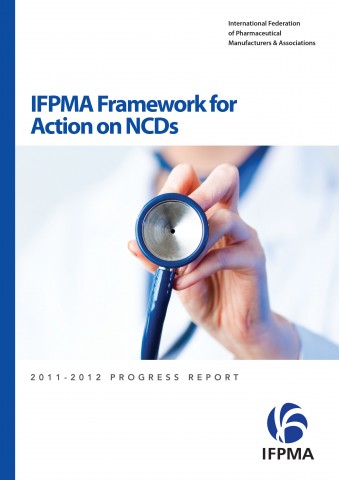The research-based pharmaceutical industry launches today a Framework for Action to respond to concerns that cardiovascular disease, cancer, diabetes and chronic respiratory diseases are posing mounting threats to public health as well as public and private finances worldwide. The industry’s ten-point Framework scopes out specific areas of action to tackle non-communicable diseases (NCDs) including innovation, access and affordability, prevention and health education. It also underscores the essential role of partnerships and dialogue in implementing the Framework. The NCD Framework for Action brings together the global research-based pharmaceutical industry in support of the World Health Organization’s (WHO) Action Plan on NCDs and the Moscow Ministerial Declaration. It will be presented today at the United Nations (UN) Civil Society Hearings in New York, held to prepare for the UN High Level Meeting on NCDs to take place in September, which aims to secure an action- oriented UN response to the rise of NCDs. The aim is that the NCD Framework for Action will provide a sound basis for the research-based pharmaceutical industry to partner with the people on the ground, governments and the WHO to find ways to address prevention, care and treatment for NCDs in the developing world.
NCDs are the leading cause of death and disease worldwide, killing more than 36 million people in 2008, with nearly 80% of these deaths occuring in low- and middle-income countries. NCD deaths are projected to increase by 15% globally between 2010 and 2020. In part, this is due to progress made in combating infectious diseases through economic growth, development, and better treatment options; but it is also largely linked to lifestyle choices. For most infectious diseases, rapid access to diagnosis and treatment is an imperative for patient survival. But for NCDs the “lifecycle” is different, and there may be many actions that can take place, such as prevention, before medicines or other treatments need to be prescribed.
The Framework for Action on NCDs focuses on the areas where the research-based pharmaceutical industry can make the most significant difference, such as innovation, access and affordability, but also prevention and health education. Eduardo Pisani, IFPMA Director General explains: “The framework is just the beginning; our vision is to work with others to identify what can be done in practice to help poor people to access the care and treatment they need. Together we want to find ideas for concrete actions to put on the table in the aftermath of the UN NCD Summit in September. The Framework is our roadmap for this work.” The IFPMA also pledges to report regularly on industry’s progress and share updates with stakeholders, such as the WHO and other interested agencies.
The Framework confirms the industry’s crucial role in continued investment in R&D programmes dedicated to the development of innovative medicines for the prevention and treatment of NCDs to enhance the lives of patients. There are currently over 1,500 medicines in the pipeline for major NCDs. The industry will also endeavour to address its innovation towards the specific needs of developing world populations and settings. To this end, in addition to the Framework, the pharmaceutical industry will launch a programme of research that will improve its understanding of the specific needs of developing world populations.
Actions on access and affordability of NCD treatments include promoting the right policy, regulatory and supply chain environments that secure optimal quality of care for patients and enable companies individually to implement commercially sustainable access and pricing strategies for the supply of NCD vaccines and medicines to the developing world.
It is estimated that half of deaths caused each year by NCDs are preventable 1 , and lifestyle choices that often accompany improvements in living standards, such as unhealthy diet and tobacco use, are part of the explanation. The Framework for Action highlights the importance of prevention so that individuals can make informed lifestyle choices. Industry is also working with the World Health Professions Alliance to develop an NCD scorecard that will be shared with over 26 million health care professionals in more than 130 countries to help encourage patients to identify and prevent risky behaviors. Reducing disability or deaths through increased investment in prevention programs will contribute to higher economic growth and allow limited resources to be focused efficiently on patients most in need.
Eduardo Pisani, IFPMA Director General explains: “This NCD Framework for Action represents a paradigm shift for the research-based pharmaceutical industry. It puts our industry’s collective global health responsibilities firmly at the forefront of how we see our role in the global health community. Let’s be clear: it is not about altruism, but rather about revolutionising our relationship to others. Times are tough for governments, business and patients. In order to tackle the rise of NCDs, and stay the course, we need to look at sustainable new approaches to global health which have prevention at its core.”
Geneva, New York, 16 June 2011












